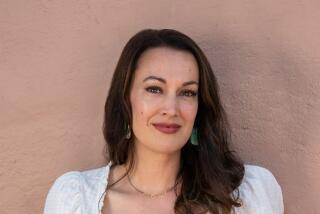The Writerâs Craft: Denise Hamilton on âDamage Controlâ
Denise Hamilton knows Los Angeles and mystery stories: Sheâs the editor of âLos Angeles Noirâ and its sequel and once covered the city as a reporter for the Los Angeles Times. Sheâs stepped aside from her Eve Diamond mystery series to write âDamage Control,â due to be released Tuesday, about a thirtysomething crisis consultant with her first big case â a senatorâs aide has been found murdered â that has ties to her past.
At the heart of the story is a relationship between Maggie Silver and Annabel Paxton, who was her best friend in high school. But 15 years have gone by and theyâre just reconnecting.
What I wanted to establish up front was the intensely close relationship that these two teenage girls had. For me, in high school, everything was so raw, the stakes were so high. Teenage girls spend every spare minute together: They eat the same thing, do their homework together, obsess over the same music and the lyrics. These things have this almost totemic, talismanic quality. This relationship was so intense that when a bad thing happens to them, of course itâs going to shatter all of that, itâs going to leave them haunted.
Something bad happens to them at a beach party.
I grew up in L.A. going to the beach and beach parties with friends. I always had conflicted feelings about the beach and beach culture, and the shadows and darkness that lay behind it. âSurf noirâ is the term that people bandy about. Kem Nunnâs âTapping the Sourceâ is an amazing book, about the dark, druggy side of hedonistic beach culture. The beach is so physically beautiful, the waves and white sand; but as a crime writer youâre thinking about used rubbers buried in the sand, hypodermics, skin cancer, âroofies.â
Intoxicating substances play a part in the book, but not in the classic sense of the private detective with a bottle in the bottom drawer.
Iâve been fascinated by Adderall. I had read about how it was extremely common on college dorms and it was the âsmart drug.â Someone like Maggie Silver, she wouldnât be an alcoholic â she would be way too concerned about losing control. She wouldnât be doing cocaine or smoking pot. But Adderall is legal, and it would hone her perceptions, make her very focused. It seemed like the perfect drug for a young white-collar employee who was looking to make a name for herself. Not that Iâm advocating it in any way, God knows. It was a good character flaw to give her.
Why did you make her a crisis consultant?
I wanted someone who would have access to the sources of power, who would be a person who was in that world and yet not of it. I had some interviews with some crisis management people. Do you have to believe your client is innocent? What if they did it, how do you deal with it? At the time, at the L.A. Times and newspapers all over the country, people were losing their jobs. A lot of my former colleagues have gone to work in public relations. Thatâs a path not taken for me. How would I handle jumping over to what journalists have often called âthe dark sideâ? Iâm not knocking the industry â thereâs plenty of wonderful, smart, upstanding people in PR.
When I was writing the book, the Tiger Woods scandal was going on, and John Edwards had fathered a child with Rielle Hunter, the blond videographer that was on his staff. I was seeing what their representatives said to the press. I was fascinated by how they dealt with those scandals as they emerged. Then when the book was ready to go to press, it was Arnold Schwarzeneggerâs love child, and I thought, âWow, this topic, a political sex scandal, is a topic that is eternal!â
So would you call this a surf noir, a detective story, a political thriller?
Ultimately I wrote a political thriller about a political sex scandal, but the heart of it is the relationship between the two girls. It wasnât so much that Maggie Silver was going to find out who did it; Maggie Silver was going to be living her life and trying to keep her job and balancing on a tightrope on top of a swimming pool filled with sharks, and she was blindfolded, and she had to step very, very carefully because there were so many dangers and pitfalls.
More to Read
Sign up for our Book Club newsletter
Get the latest news, events and more from the Los Angeles Times Book Club, and help us get L.A. reading and talking.
You may occasionally receive promotional content from the Los Angeles Times.










